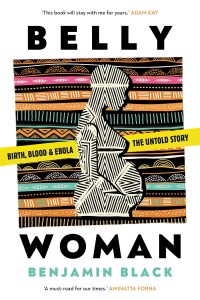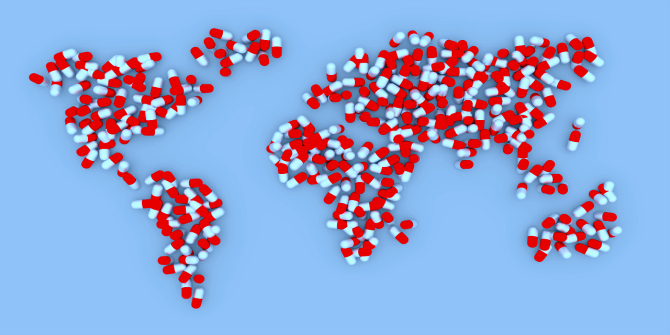In Belly Woman: Birth, Blood and Ebola: The Untold Story, Benjamin Black gives a first-hand account of the 2014 Ebola outbreak in Sierra Leone and the efforts of communities and healthcare workers to save the lives of pregnant women at risk. Black’s gripping exposé indicts the slow and inadequate response by international health agencies and argues for better-resourced healthcare systems, better reproductive healthcare for women and valuing local expertise to prevent future epidemics, writes Susannah Mayhew.
Belly Woman: Birth, Blood and Ebola: The Untold Story. Benjamin Black. Neem Tree Press. 2023.
 Belly Woman: Birth, Blood and Ebola, the Untold Story has the fluidity and compulsion of a novel while providing fascinating insights into frontline action and research on the effects of Ebola on pregnant women and how to protect them. Written by obstetrician gynaecologist and aid advisor Benjamin Black, the book arises from his years spent with Médecins Sans Frontiers (MSF) before, during and after the devastating Ebola outbreak in Sierra Leone between 2014-2016. Structured in three parts, it first takes us through the desperate early months of epidemic response in which healthcare staff charted unknown territory as they managed the “mindboggling” (77) complexities of caring for pregnant women with Ebola. We then return to Sierra Leone a few months later to an improving situation in which Ebola in pregnancy could safely be managed, but local learning was ignored by international responders (who had eventually arrived). Finally, as the epidemic declines, we witness the ongoing post-Ebola tragedy of maternal death.
Belly Woman: Birth, Blood and Ebola, the Untold Story has the fluidity and compulsion of a novel while providing fascinating insights into frontline action and research on the effects of Ebola on pregnant women and how to protect them. Written by obstetrician gynaecologist and aid advisor Benjamin Black, the book arises from his years spent with Médecins Sans Frontiers (MSF) before, during and after the devastating Ebola outbreak in Sierra Leone between 2014-2016. Structured in three parts, it first takes us through the desperate early months of epidemic response in which healthcare staff charted unknown territory as they managed the “mindboggling” (77) complexities of caring for pregnant women with Ebola. We then return to Sierra Leone a few months later to an improving situation in which Ebola in pregnancy could safely be managed, but local learning was ignored by international responders (who had eventually arrived). Finally, as the epidemic declines, we witness the ongoing post-Ebola tragedy of maternal death.
The book is both a powerful story of how medics of all nationalities strived to save lives against the odds and a deeply personal, sharply political book about the existing inadequacies of women’s reproductive healthcare which were tragically magnified during Ebola.
The book is both a powerful story of how medics of all nationalities strived to save lives against the odds and a deeply personal, sharply political book about the existing inadequacies of women’s reproductive healthcare which were tragically magnified during Ebola. The book swings back and forth in time as Black juxtaposes his London experiences of maternal care, particularly during Covid, with the raw accounts of actions in Sierra Leone. This sets the desperate inadequacies of facilities in Sierra Leone in stark relief against the smooth functioning, highly resourced facilities of the UK. It also highlights, in both situations, the dangerous consequences of arrogance when it drives decision-making by those in positions of political and medical power. The lived experiences of Black’s narrative provide a quietly damning judgement on the world’s response to Ebola and the ubiquitous failure to listen to and learn from those in the frontlines of crisis response – both medics and ordinary citizens.
The lived experiences of Black’s narrative provide a quietly damning judgement on the world’s response to Ebola and the ubiquitous failure to listen to and learn from those in the frontlines of crisis response – both medics and ordinary citizens.
Part one of the book plunges us into the thick of the epidemic as local and international staff struggle to the point of frustrated exhaustion to deal with the pace and scale of an epidemic which “should never have exploded […] It had all happened in slow motion and was totally predictable”, yet the world ignored it – “I felt like we were screaming into a vacuum.” (166). Black gives us rich insight into the extent of grass-roots medical efforts in responding to the disease and gathering hitherto undocumented data on the impact of Ebola on pregnancy. He reveals a world in which “[r]oulette, not medicine, became the order of the day” (40) with staff operating in an ethical “no-man’s land” (65). They faced daily dilemmas: what do you do with a pregnant woman in critical condition who might have Ebola but without immediate obstetrics intervention would not survive the time it took to get the Ebola test-result back? Frontline doctors kept their own notes and shared their own learning, creating some of the first (and only) research on how Ebola affects pregnant women and their unborn foetuses, and how to manage such pregnancies safely.
Frontline doctors kept their own notes and shared their own learning, creating some of the first (and only) research on how Ebola affects pregnant women and their unborn foetuses
The slowness and inadequacy of the international response to the West Africa Ebola epidemic is well known, but the book still shocks with its detail of the nature and consequences of the wider response. Seven months after the first officially diagnosed case the international “cavalry” arrive, prompted by concerns of a risk to global health security, and ironically but predictably “in synchronicity with declining transmission” (210). In Part Two Black describes the shameful in-fighting between international responders desperate to make their mark and claim territory. He and his colleagues in the field joked darkly of “Ebola tourists”, the “EOAs (Experts On Arrival)” (181) and the “hot-headed rigidity and lack of pragmatism” of the UK military response (215) all of whom sometimes put patients at risk despite available lessons that could have avoided this.
The WHO ignored local learning and produced guidelines for the Ministry of Health that directly undermined the management of pregnant women post-Ebola, and failed again to listen when frontline MSF doctors voiced their concerns.
Even in the final throes of the epidemic (Part Three), when so much should have been learned, there are distressing illustrations of the power of arrogance. The WHO ignored local learning and produced guidelines for the Ministry of Health that directly undermined the management of pregnant women post-Ebola, and failed again to listen when frontline MSF doctors voiced their concerns. This lead directly to unnecessary deaths before the guidelines were finally repealed – truly, “Egos can kill” (324). This approach that discounts local knowledge has been seen repeatedly, including in Democratic Republic of Congo’s biggest Ebola outbreak just two years later despite attempts to improve feedback from communities, and in the UK’s own Covid response as lessons were “forgotten, wilfully ignored or recycled for the next emergency” (239). The damage that ignoring important lessons can do is agonisingly exposed in the many unnecessary deaths of pregnant women that Black describes. He notes that though experimental drugs and vaccines were promising, they could not “replace basic hygiene, health promotion and community engagement” (167) – and to achieve this trust in health workers is key.
Trust in healthcare cannot be built by a ‘revolving door’ of international medical health workers and ‘experts’; it is built through local health staff working tirelessly on the ground
Although not explicit in the book, the breakdown of trust has longstanding repercussions that echo through the book’s narratives of both Ebola and UK Covid responses. Trust in healthcare cannot be built by a “revolving door” (9) of international medical health workers and “experts”; it is built through local health staff working tirelessly on the ground: “As the outside world, with all its resources and capability, held back in fear and self-protectionism, these individuals stood firm, and […] played a part in saving us all.” (159). Yet, these people were largely ignored when the world was congratulating itself on saving the day (329), though some, like Black’s trusted local colleague Morris, gave their lives.
During the epidemic, pregnancy was seen as an explosive risk […] but afterwards, maternal mortality and morbidity – like much of women’s health – were too often invisible
The question of how to tackle the underlying “protracted health crisis” (113) of high maternal mortality rates haunts the third part of the book. Black and his colleagues were acutely aware that, “[t]he end of Ebola was not the end of the emergency, just as the start had never been the beginning.” (316). During the epidemic, pregnancy was seen as an explosive risk (a potential “Ebola bomb” ch.25), but afterwards, maternal mortality and morbidity – like much of women’s health – were too often invisible so “if you didn’t look for it, you didn’t see it, and if you didn’t see it then there was no emergency” (254). This meant that even MSF’s hierarchy failed to acknowledge the absolute necessity of supporting family planning as a critical preventive measure for high-risk pregnancy and maternal death.
There is an urgent need to rethink humanitarian approaches in light of Black’s insights, to humbly learn from and work with frontline responders to strengthen health systems and protect the health of all women and young children.
Following Ebola, Sierra Leone overtook Sudan and Chad to suffer the highest maternal mortality rate in the world. The colonial and neo-colonial legacy of aid-dependent, resource-poor health systems unable to respond to major shocks like Ebola undoubtedly contributed to this protracted health crisis, but arguably the superiority mindset of many international responders compounded and perpetuated it. There is an urgent need to rethink humanitarian approaches in light of Black’s insights, to humbly learn from and work with frontline responders to strengthen health systems and protect the health of all women and young children. In making this case, Belly Woman is an extraordinary book – a visceral, harrowing but ultimately life-affirming read.
This post gives the views of the author, and not the position of the LSE Review of Books blog, or of the London School of Economics and Political Science. The LSE RB blog may receive a small commission if you choose to make a purchase through the above Amazon affiliate link. This is entirely independent of the coverage of the book on LSE Review of Books.
Image Credit: Samenwerkende Hulporganisaties on Flickr.







